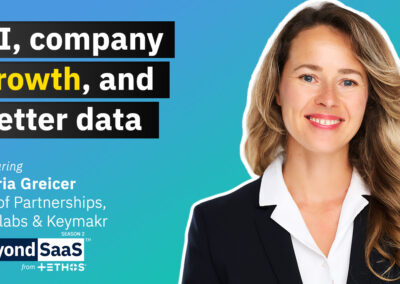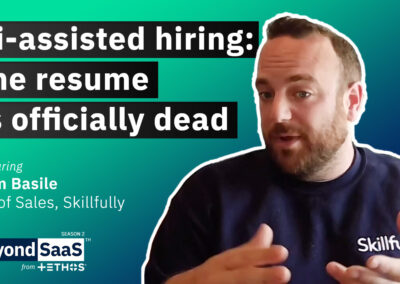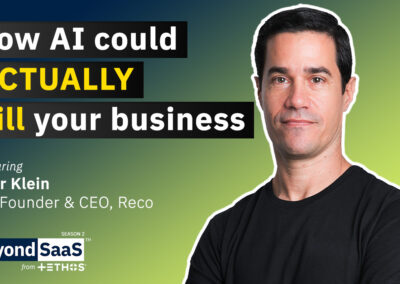Zach Scheel, CEO of Rhumbix discusses challenges and strategies for growing a tech company in this episode of BeyondSaaS. Zach shares insights on leadership, navigating the startup phase, transitioning to growth, and the importance of data-driven marketing. He emphasizes the need for resilience, the value of building relationships, and the significance of taking ownership as a leader. The conversation also touches on emerging trends in construction tech, including the use of AI tools.
Takeaways
- Leadership is crucial for the success of a tech company.
- The startup phase is filled with challenges and requires resilience.
- Data tracking is essential for understanding customer needs.
- Investing in revenue operations early can pay off later.
- Building a strong brand is key in a competitive market.
- Educating the industry about new technologies is necessary.
- Surrounding yourself with trusted advisors is important for growth.
- Taking ownership of failures fosters authenticity in leadership.
- Emerging AI tools can enhance marketing efforts in construction tech.
- Building relationships in the industry is vital for lead generation.
Sound Bites
- “There’s a lot of educating the industry.”
- “You need boots on the ground.”
- “Hang in there, there will be dark days.”
Show Notes
BeyondSaaS Transcript
Jason Niedle
Today we’re talking with Zach Scheel, CEO of Rhumbix, about how to keep your tech company growing in a tough environment. Welcome to Beyond SaaS, Zach. Before we jump in, do you have a golden nugget for us today?
Zach Scheel
Yeah, I’m a big leadership scholar, enthusiast, and practitioner. One of the frameworks I really like is from The 15 Commitments of Conscious Leadership. Another book I recommend is Extreme Ownership by Jocko Willink, a former Navy SEAL. His quote, “There’s no such thing as bad companies, just bad leaders,” really resonates with me. Conscious leadership is crucial for building resilient, growth-oriented companies that can endure challenges and succeed long-term.
Jason Niedle
I love both of those and will check them out. My golden nugget today—if I were in construction, it would be Rhumbix because I love the idea of having all my information consolidated. But since I’m not, I’ve been enjoying Fireflies.ai, an automated AI note-taking app. It lets me search across all my calls, ask AI questions about past conversations, and get instant summaries.
For those unfamiliar with Zach, he co-founded Rhumbix, a platform that streamlines construction workflows like timekeeping, production tracking, health and safety reporting, and more—all accessible from an iPad in the field. Before that, Zach was a Naval civil engineer managing large-scale military construction projects in Djibouti, Chile, and Washington state. I worked with Zach’s team about five years ago, and I can tell you firsthand—they’re incredibly competent.
Zach, can you give us a high-level overview of what Rhumbix does and your specific role in it?
Zach Scheel
Sure. We help commercial, industrial, and infrastructure contractors track real-time data from the field. Rhumbix is a field and workforce management platform for companies with craft labor in the field. We help them collect critical data, analyze trends, and ultimately deliver projects ahead of schedule, under budget, and with zero safety incidents.
Jason Niedle
That’s the magic trifecta! So what’s your role in all of this?
Zach Scheel
I co-founded Rhumbix 11 years ago. Before that, I worked in the construction industry and felt like a glorified administrator—my “unique skill” was knowing how to compress PDFs to fit within the Navy’s 10MB email limit. That frustration inspired me to push the industry forward.
I saw a gap where I had the skills to raise venture capital, understood construction, and could run a software business. My role has always been about driving industry change—helping construction evolve from the 20th to the 21st century through better software.
Jason Niedle
That’s a huge challenge in construction, right? So now that you’re past the startup phase and in mid-stage growth, what challenges do you commonly see?
Zach Scheel
Yeah, everyone talks about the startup phase and the exit, but not enough people talk about the messy middle. Scott Belsky wrote a great book called The Messy Middle, which I recommend to any founder three to five years into their startup.
The key traits that help companies survive this phase are grit and resilience. You endure countless setbacks—probably 10 to 100 gut punches for every high five. You have to control your emotions because your team feeds off your energy. The companies that succeed learn from failures, systematize what works, and keep optimizing.
Jason Niedle
That makes sense. My last guest talked about how companies don’t always track what’s working. How do you measure what’s effective for Rhumbix?
Zach Scheel
One of the best things we did was invest in revenue operations (RevOps) earlier than most companies would. Coming from the Navy, I had never used a CRM before, so it took us five years before hiring a RevOps specialist. That person helped us structure data properly—how we track leads, map the lead-to-cash process, and analyze closed-lost deals.
It seems like micromanagement at first, but structuring data correctly early on lets you later validate (or invalidate) sales strategies using real insights. Your gut instinct is important, but it’s even better when backed by data.
Jason Niedle
That transition from scrappy startup to structured scaling is tough. What did you have to change about your leadership style?
Zach Scheel
It’s about putting in systems and processes for scalability. Some early employees may not scale with the company, so you have to constantly evaluate your leadership team.
For me, surrounding myself with strong advisors was key. As CEO, it’s hard to get honest, direct feedback, so I made sure to get mentors—both inside and outside the company—who could hold up a mirror and tell me things I might not want to hear but needed to hear.
Jason Niedle
I relate to that—learning to take feedback has been a huge shift for me. What about marketing? How did your approach change to reach the next level?
Zach Scheel
When we started, construction tech was in its infancy—there were maybe 40–50 startups in the space. A lot of existing software was legacy, desktop-based, and on-premise. So our early marketing was all about education:
- Explaining cloud-based, mobile-first systems
- Quantifying the ROI of digital tools
- Showing the cost of bad data
After that, we focused on brand building. Construction is a brand-driven industry—think DeWalt, Hilti, Milwaukee Tools. We built our brand around Workers First—making software that field workers actually like using. Only after that did we optimize our lead funnel, balancing digital marketing, SEO, and in-person events.
Jason Niedle
Now that you’ve built that foundation, what’s your biggest challenge?
Zach Scheel
Over the last couple of years, we shifted from a high-growth startup to a profitable business. The changing capital markets forced that transition, but it’s been a great shift.
Before, we were chasing growth at all costs. Now, we focus on profitability at all costs. Instead of throwing cash at experiments, we run small, well-defined ROI-based tests. It’s about doing fewer things, but doing them well.
Jason Niedle
Can you give an example of something you haven’t invested in but might later?
Zach Scheel
A podcast. A lot of companies are doing them for brand awareness and education, and it’s a great channel. But it’s resource-intensive, and we’ve focused on digital content, in-person events, and LinkedIn marketing. If we take a larger growth equity investment, that’s something we might revisit.
Jason Niedle
What’s blocking you most in marketing right now?
Zach Scheel
Finding companies that don’t have a digital presence. Many large construction firms are still using paper processes, and they’re not on ZoomInfo or LinkedIn. So we rely heavily on referrals, industry associations, and word-of-mouth from existing customers.
Jason Niedle
What’s been most effective for lead generation?
Zach Scheel
A mix of grassroots marketing and LinkedIn ads. Google Ads have become more expensive with lower ROI, so we’ve leaned into LinkedIn—companies that engage there are more likely to invest in software.
We also invest in trade associations—both national and local—because that’s where our customers spend their time.
Jason Niedle
Final question—what trends are you watching?
Zach Scheel
I’m really excited about Gen AI tools for marketing. Platforms like Synthesia and HeyGen can generate realistic AI avatars for training and onboarding videos. Imagine automating product tutorials in multiple languages instantly. It’s early days, but the potential is massive.
Jason Niedle
Amazing. Where can people learn more about Rhumbix?
Zach Scheel
Visit Rhumbix.com. If you work in construction or know someone who does, send them our way!
Jason Niedle
Thanks, Zach! To our listeners—if you’re a leader in a mid-stage tech company, drop us your questions and feedback. Like and subscribe, and we’ll see you next time on Beyond SaaS.




